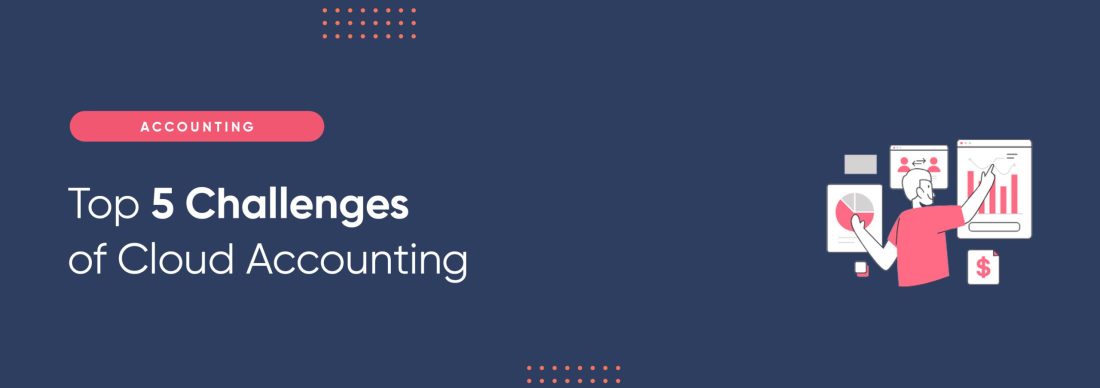Top 5 Challenges of Cloud Accounting
Jun 13, 2023 | 6 Min Read


Jump to Sections
Stay updated
with our Blogs
We will keep you updated about our latest blogs
Share This Blog
1. Data Security
Data security can prove to be more challenging in cloud accounting vs traditional accounting systems. Some of the factors for this are listed below:
- Remote Servers: In traditional accounting, financial data is stored in the business’s own local servers or physical storage devices, giving them direct control over the security of the data. On the other hand, with cloud accounting, data is stored on remote servers often operated by third-party companies. This introduces security risks, as the business must rely on the cloud provider’s infrastructure and security measures to secure the data.
- Shared Infrastructure: While strong isolation measures are implemented by cloud providers, the use of shared resources increases the risk of a breach on one user spreading to other users.
- Increased Possibility of Attacks: The use of the internet to access and store all data makes the business susceptible to cyber-attacks. The increased attack surface results in a greater need for security measures related to phishing, malware, and data breaches.
These challenges require businesses to implement strong security measures such as regular data backups, encryption, access controls, employee training, and more to protect the data from attacks.
2. Integration with Legacy Systems
- Technological Incompatibility: Traditional accounting systems often make use of outdated technologies or proprietary protocols that are incompatible with modern software. The differences in software architecture can make integration both time-consuming and difficult.
- Data Migration: The current systems in place may use data formats that are not directly compatible with cloud accounting platforms. This requires data to be transformed into an acceptable format to prevent any loss or corruption of data during the migration process, which can also be quite complex.
- Dependency: Some organizations may have their outdated accounting systems deeply integrated with crucial business processes. Untangling these dependencies and aligning the workflows may require careful analysis, customization, and planning, to minimize disruptions in ongoing operations.
Want to learn about the next steps for growing your business ?
3. Connectivity
Connectivity can pose challenges in cloud accounting vs traditional accounting systems, due to various reasons. One of the major challenges is the dependency on the internet for access to the software and data stored in the cloud. Slow internet speeds, network unavailability, or other interruptions can temporarily hinder operations.
Similarly, scheduled maintenance or sudden outages can impact the availability of the system. This is in comparison to traditional systems where downtime is often under the control of the business and backups are in place for smooth operations.
Connectivity and reliability issues can be addressed by having reliable internet connections, backup connectivity options, and contingency plans in case of any service interruptions. It is equally important to ensure that the chosen cloud accounting provider has a proven track record, reliability, as well as uptime.
4. Vendor Selection and Scalability
Vendor selection can be a challenging process due to various reasons such as:
- Numerous Vendors in the Market: There are a number of cloud accounting providers in the market offering various pricing models, support, and security levels. Choosing the most appropriate vendor can be challenging and requires thorough research, as well as careful consideration, keeping in mind the ability of existing systems to integrate with newer systems.
- Scalability: It is crucial for cloud accounting solutions to offer scalability, allowing businesses to accommodate growth and changing requirements. Assessing vendors is necessary as some providers may have limitations in terms of data storage, user capacity, or processing power, which may pose a bottleneck when the business expands.
- Pricing: All current and future costs should be considered before deciding. These costs could include subscription fees, cost per user, cost per feature, additional storage costs, and so on. These costs must align with the budget of the business and financial goals.
5. Training and Adoption
The transition from a traditional system to cloud accounting software can be challenging for users as it may require new technical skills to be learned, adapting to the new interface, and oftentimes, resistance to change may be seen. Furthermore, the initial stages of the learning curve may be time-consuming, as it requires users to familiarize themselves with the new system and functionalities.
The business must provide training sessions and ongoing support while users may need to keep themselves up to date with new updates or features in the system. Additionally, user involvement can promote a sense of ownership and engagement by addressing their concerns and taking feedback for any potential improvements that may be required in the new system.
How Accountimize Can Help You Navigate Through These Challenges:
At Accountimize, we understand that each business can experience many challenges in adopting cloud accounting. With our expertise, we can navigate your company through the storm with our tailor-made solutions and guide you to success.
So, place a call with one of our CPAs to discuss how we may cooperate for growth and success.
Book a Discovery call


Stay updated
with our Blogs
We will keep you updated about our latest blogs



